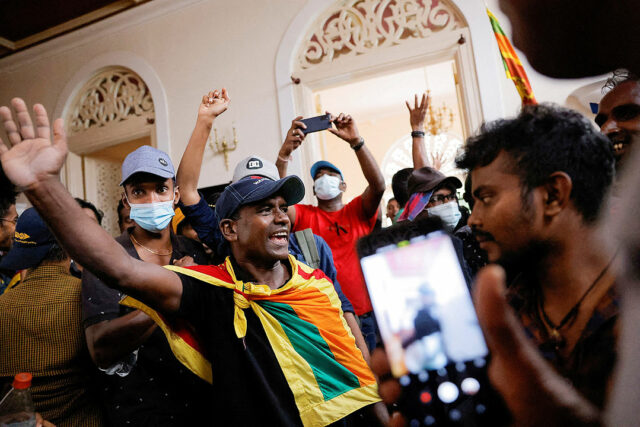Sri Lanka’s Rajapaksa quits; ‘We are the real power’ says protester
COLOMBO — The speaker of Sri Lanka’s parliament formally accepted President Gotabaya Rajapaksa’s resignation on Friday after he fled to Singapore to escape a popular uprising brought about by his country’s worst economic crisis in seven decades.
“From this point, we will move to constitutionally appoint a new president,” the speaker, Mahinda Yapa Abeywardena, told reporters. “It will happen quickly and successfully. I request everyone to support this process.”
Mr. Rajapaksa landed in Singapore on Thursday, having fled to the Maldives early on Wednesday on a military jet along with his wife and two security guards. Protesters stormed his residence and office last Saturday.
“We are so happy today that he resigned and we feel that when we, the people, come together, we can do everything,” said Arunanandan, 34, a school teacher who had been camping at the main protest site opposite the presidential secretariat for the past three months.
“We are the real power in this country.”
The news of Mr. Rajapaksa’s resignation, first sent by an e-mail to the speaker before a hard copy was delivered, triggered jubilation in Sri Lanka’s main city Colombo late on Thursday.
Crowds set off firecrackers, shouted slogans and danced ecstatically at the Gota Go Gama protest site, named mockingly after Mr. Rajapaksa’s first name.
Speaker Abeywardena said he hoped to complete the process of selecting a new president in seven days and that parliament will reconvene on Saturday. The agenda for the weekend meeting will be decided on Friday, and voting for the next president in parliament was scheduled for July 20.
Prime Minister Ranil Wickremesinghe will act as the interim president and he is also the first choice of the ruling party to take over full time, though no decision has been taken. The opposition’s nominee is Sajith Premadasa, while the potential dark horse is senior lawmaker Dullas Alahapperuma.
Street protests against Sri Lanka’s economic crisis have simmered for months and came to a head last weekend when hundreds of thousands of people took over government buildings in Colombo, blaming the Rajapaksa family and allies for runaway inflation, shortages of basic goods, and corruption.
Serpentine queues outside fuel pumps have become common, while the government has closed schools and enforced work-from-home for office workers to conserve fuel. The country of 22 million has nearly run out of dollars for imports and defaulted on foreign loans.
Headline inflation hit 54.6% last month and the central bank has warned that it could rise to 70% in coming months.
Sri Lanka had begun preliminary discussions with the International Monetary Fund (IMF) about a potential bailout loan, but these have been interrupted by the latest government chaos.
IMF spokesman Gerry Rice told reporters on Thursday that Fund staff were still in contact with technical-level government officials but hoped to resume high-level dialogue “as soon as possible.” — ReutersA





Nessun commento:
Posta un commento